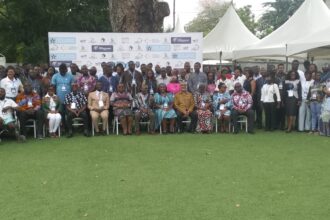Child Under nutrition, or call it Malnutrition affects millions of children across the world. Africa alone has estimated that 58.7 million children under the ages of five are stunted, meaning, they are having a low height for a given age and 13.8 million who are wasting – low weight for a certain height. There is no doubt that stunted children today will lead to stunted economies tomorrow.
African nations lose between 1.9% and 16% of the gross domestic product (GDP) annually to under nutrition due to increased mortality, absenteeism, and chronic illnesses and loss of productivity. Governments alone cannot address this issue.
Cost of child under nutrition to Ghana’s economy
Ghana’s situation is not different from the continental picture depicted above and there is a central role for policymakers in tackling this challenge in order to achieve the Sustainable Development Goal 1 (poverty reduction) and SDG 2 (hunger & nutrition).
According to nutrition experts, malnutrition in childhood and pregnancy has many adverse consequences for child survival and long-term well-being. It also has far-reaching consequences for human capital, economic productivity, and national development overall and making the state to lose about $2. 6 billion annually due to problems associated with poor nutrition in children, a United Nations report revealed in 2016.
Per the UN’s Global Nutrition report titled: The cost of hunger in Africa: the social and economic impact of child under nutrition on Ghana’s long-term development, malnutrition in children has increased the country’s healthcare costs and put a burden on the country’s educational system.
According to the report, “In the Northern Region of Ghana, 30 percent of children under five are stunted or chronically malnourished.” This is not only affects their growth but also their educational development and economic potential, and consequently the future of the country.”
“The losses to the economy can be averted through strategic interventions, which ensure adequate nutrition for mothers and young children,” it added.
The report said when children missed out on critical nutrients, including proteins, vitamins and minerals, their growth while in the womb was hindered. If that happened during the first two years of life it caused stunting, which is of particular concern, it added.
“People affected by stunting face lifelong consequences starting in childhood, such as frequent illness, poor school performance, having to repeat classes or dropping out altogether, and low workplace productivity,” the study explained.
The study also revealed that 37 percent of the adult population in Ghana suffered from stunted growth. At least 24 percent of child mortality cases were associated with under nutrition, it said.
The National Nutrition Policy
In July 2016, a National Nutrition Policy was launched in Accra with the aim to increase the coverage of high-impact nutrition-specific interventions that ensure optimal nutrition of Ghanaians throughout their lifecycle, with special reference to maternal health and child survival.
At the launch, the former Minister for Heath, Mr Alex Segbefia noted that despite the progress made so far by government in improving nutrition, there was the need to recognize that there were still significant numbers of the Ghanaian population for whom progress had not been fast enough, adding that in some regions, rural areas and poor urban areas, progress in the reduction of malnutrition, especially anaemia and stunting, had been slow and uneven.
Current statistics from the World Health Organization (WHO) also suggest over 150 million children under age five are stunted, with the majority of these children living in sub-Sahara Africa.
V4C programme to augment Govt’s effort
To find a lasting solution to this worrying menace, there must be a concerted effort from all. It is to augment the government’s efforts that Voices for Change (V4C) programme led by SNV Netherlands Development Organization has prioritised food Nutrition in its programmes.
The programme V4C partnership programme focuses on generating evidence and building the capacity of Civil Society Organisations to carry out evidence-based advocacy in the following thematic areas; Renewable Energy, Food and Nutrition Security and Water, Sanitation & Hygiene (WASH).
Mr Eric Banye, Country Programme Coordinator of V4C partnership said at a Learning event held in Accra recently that sustainable nutrition is key for all.
However, nutrition has always been regarded in most part as an afterthought in development priorities and seriously underemphasized.
“Therefore we need to create the awareness, generate evidence and develop more inclusive collaborative approaches to collectively address the issue of malnutrition in Ghana.”
According to Mr. Banye, there is ample evidence that the cost of our inaction or limited action would lead to increase child mortality, compromised survival chances and reduced economic productivity. He noted that “Malnutrition especially among children and pregnant women have a serious repercussion on future generations. It’s time to act and the time is NOW. We need to prioritize nutrition in all our development plans.”
CSOs making inroads
According to the Peasant Farmers Association of Ghana,(PFAG) one of the CSOs working under the V4C partnership programme, specifically on the food nutrition and post-harvest loses component, Metropolitan Municipal and District Assemblies (MMDAs) are beginning to prioritize nutrition related issues in their medium term programmes.
Getting the buy- ins of the district assemblies was a major milestone chalked by the CSOs working under the V4C programme since the project’s inception.
In an interview with Public Agenda, Mr Bismark Owusu Nortey, Programme Officer at PFAG said his outfit is assisting in this area to ensure that there is sustainable nutrition for all.
That, he explained, is being done through generating knowledge, evidence and building capacities of interested key stakeholders so that they are able to influence authorities both at the national, local or district levels to create the environment for an improved service delivery to ensure that there is improved nutrition for everybody.
Mr Nortey noted that though there exist a national nutrition policy which spells out the various strategies and plans what need to be executed in order to achieve the goal of good nutrition, the PFAG has observed that the implementation the policy has generally been weak.
“We have realized that there are weaknesses in the implementation of the policy. That include the lack of proper coordination with regards to nutrition activities. And there is supposed to be an inter-ministerial collaboration and that is weak. The implementing institutions in terms of their capacities and their commitment is also weak. In terms of government investment with regards to expenditure on nutrition program is also weak,” Mr Nortey pointed out.
He added, “so what we intend to do is to find means to address these gaps. What we have done over the period is that now the campaign is happening at the district and at the national levels.
He indicated that before the project, little been done in the area of nutrition, hence when the project commenced there was the need to look at the overall status of nutrition in the country.
According to him, after the organization got the information it needed, it recommended that there was need for a plan to implement the provisions of the policy. “So based on that the Ghana Health Service and their partners begun developing the nutrition implementation strategy. The document, he said is still in preparation and would soon be finalized.
He said currently there is lot of engagement among the CSOs and policy makers as the latter are given the opportunity to make input into the medium- term plans of District Assemblies.
Break through?
Mr Nortey said “In the past, issues of nutrition were not captured in the medium -term plans of the district assemblies, so it used not to be a priority for them and you know normally the priorities of the assemblies are tangible things. But now, all the districts that our CSOs are operational in, are incorporating nutrition as part of their medium -term plans.
“They are now creating committees that are handling nutrition related issues. So it is clear that now there is an attention. This is because there is a lot of noise about why you need to include issues of nutrition there. So at the district level those are some of the successes.”
He added that at the National level we also ensure that the organizations that are responsible are on kept on their toes.
Mr. Nortey called on all to support the Voices for Change campaign to rid Ghana of malnourished Children.
By Mohammed Suleman














